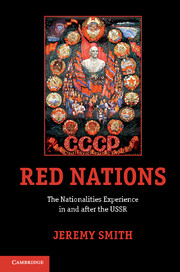Book contents
- Frontmatter
- Dedication
- Contents
- Tables
- Preface
- 1 Introduction: the prison-house of nations
- 2 Dispersal and reunion: revolution and civil war in the borderlands
- 3 Bolshevik nationality policies and the formation of the USSR: the Bolsheviks dispute national policy
- 4 Nation-building the Soviet way
- 5 Surviving the Stalinist onslaught, 1928–1941
- 6 The Great Patriotic War and after
- 7 Deportations
- 8 Territorial expansion and the Baltic exception
- 9 Destalinisation and the revival of the republics
- 10 Stability and national development: the Brezhnev years, 1964–1982
- 11 From reform to dissolution, 1982–1991
- 12 Nation-making in the post-Soviet states
- 13 The orphans of the Soviet Union: Chechnya, Nagorno Karabakh, Abkhazia, South Ossetia and Transdniester
- Conclusion
- Bibliography
- Index
- References
3 - Bolshevik nationality policies and the formation of the USSR: the Bolsheviks dispute national policy
Published online by Cambridge University Press: 05 June 2014
- Frontmatter
- Dedication
- Contents
- Tables
- Preface
- 1 Introduction: the prison-house of nations
- 2 Dispersal and reunion: revolution and civil war in the borderlands
- 3 Bolshevik nationality policies and the formation of the USSR: the Bolsheviks dispute national policy
- 4 Nation-building the Soviet way
- 5 Surviving the Stalinist onslaught, 1928–1941
- 6 The Great Patriotic War and after
- 7 Deportations
- 8 Territorial expansion and the Baltic exception
- 9 Destalinisation and the revival of the republics
- 10 Stability and national development: the Brezhnev years, 1964–1982
- 11 From reform to dissolution, 1982–1991
- 12 Nation-making in the post-Soviet states
- 13 The orphans of the Soviet Union: Chechnya, Nagorno Karabakh, Abkhazia, South Ossetia and Transdniester
- Conclusion
- Bibliography
- Index
- References
Summary
In the chaotic conditions of the Civil War, the gap between central Bolshevik policies and local implementation was most often played out in the form of undisciplined Russian soviets and Red Army bodies acting in ways that antagonised the local population. But as Soviet power became more secure, it emerged that there were real differences, based on a mixture of prejudice and ideology, which divided the Party both in the regions and at the centre. It was rarely the case that competing positions were associated exclusively with Bolsheviks of different ethnic backgrounds: the groupings that became known as the ‘National Lefts’ and the ‘National Rights’ could, in places like Crimea, both be associated with leaders from the same national group. Disagreements over policy locally were reflected in ideological divisions which went to the top of the Party leadership. Although their positions were not so far apart, subtle differences between the two Bolsheviks who had the greatest influence over nationality policy – Lenin and Stalin – had important consequences for the future of the nationalities experience in the USSR.
The different positions that had been adopted by the European Marxist movement over the national question before the First World War continued to divide the Bolsheviks during and after the Civil War. The internationalists were represented by the leading Bolsheviks Yuri Pyatakov and Nikolai Bukharin, while the right to national self-determination was defended by Lenin with the support of the commissar for nationality affairs, Iosif Stalin. Although much of the debate remained abstract, the experience of the revolution and the task of putting back together the parts of the Russian Empire that had dispersed lent these arguments a concrete urgency. At the discussion of the new Party programme in March 1919, Pyatakov argued that ‘the slogan “the right of nations to self-determination” . . . has shown itself in practice, when it comes to the question of the socialist revolution, to be a slogan which is the rallying point for all counter-revolutionary forces’.
- Type
- Chapter
- Information
- Red NationsThe Nationalities Experience in and after the USSR, pp. 53 - 72Publisher: Cambridge University PressPrint publication year: 2013
References
- 1
- Cited by



